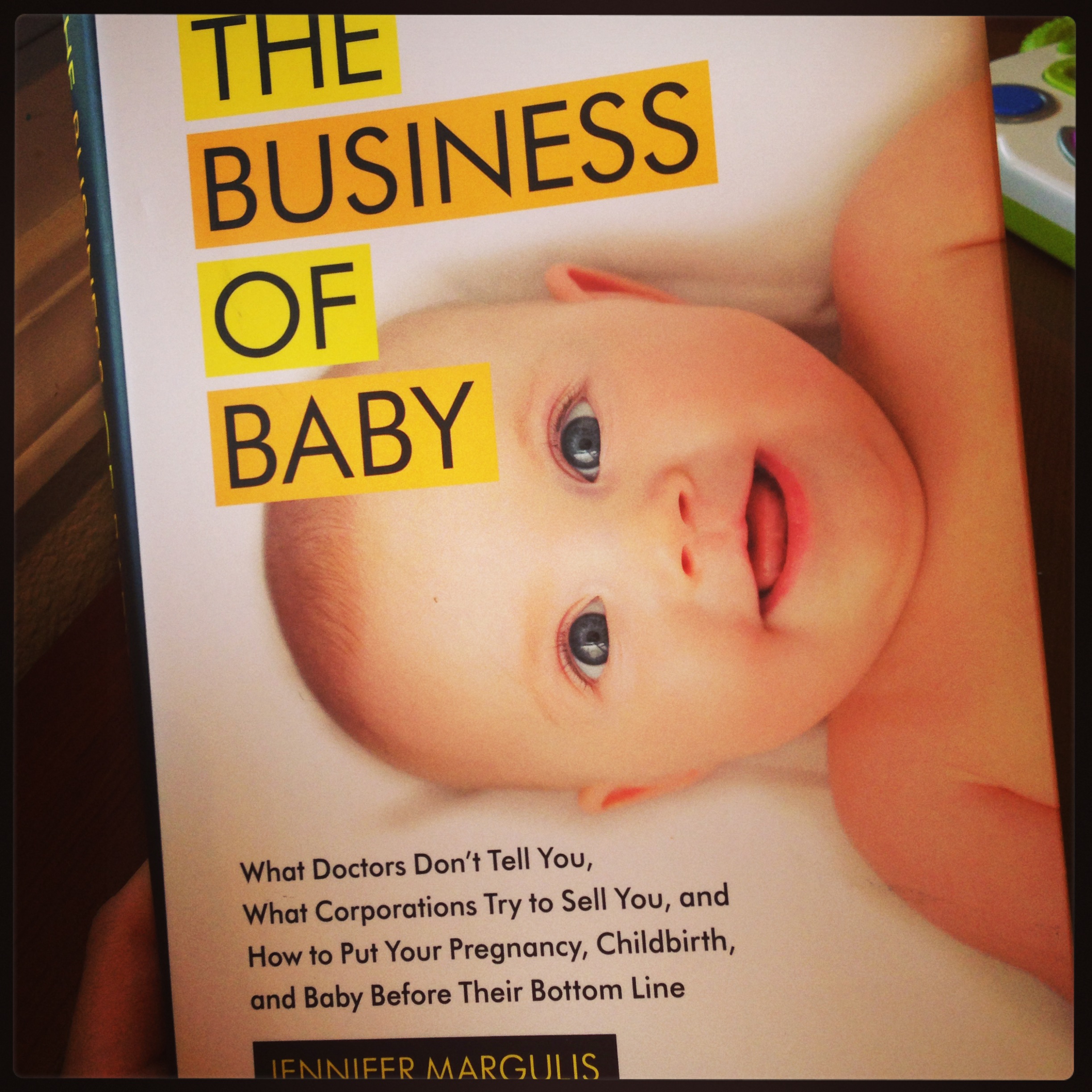 I'm currently reading "The Business of Baby", which is on my summer book list, and I think it's absolutely amazing so far. Maternal health is abysmal in the United States, and someone has finally done the dirty work to figure out why and to make conclusions as to what should be done about this. Amnesty International called the status of maternal health in this country a human rights crisis, and it's about time this message will be heard by millions of people.
However, I might be the only one.
I'm currently reading "The Business of Baby", which is on my summer book list, and I think it's absolutely amazing so far. Maternal health is abysmal in the United States, and someone has finally done the dirty work to figure out why and to make conclusions as to what should be done about this. Amnesty International called the status of maternal health in this country a human rights crisis, and it's about time this message will be heard by millions of people.
However, I might be the only one.
The book hasn't received the most positive remarks from book reviewers and other readers, and their reasons for hating this book are nonsensical. These book reviewers (I'm not even going to start on the reviews on Amazon. At least not today) are wrong about this book because critiques are made that are not only unwarranted, but also simply distract from the main message of the book. Maternal health sucks in this country, but that premise doesn't matter to these people. Never mind that below is the status quo that author Jennifer Margulis tried to investigate:
- The US is ranked 49th in the world for maternal health.
- Of the 4.3 million babies born in America each year, more than 25,000 will die in their first year.
- 1/3 of women in the US undergo a c-section.
- Only 24 states require hospitals to report adverse maternal outcomes to the state government. Only three of these states require this information to be public.
- Most states have no system in place to investigate maternal deaths.
Instead of being outraged and taking an honest look at these problems (you do agree that they are problems, right?), these reviewers scoffed at how she presented her arguments, the evidence she presents, the sources she used, as if none of this can possibly be true. For example, this review from the Oregonian said a few things that simply don't make a lot of sense. For example:
Margulis builds her argument mostly on individual parents' anecdotes, without providing context for whether they represent common experiences. Many of the anecdotes seem to have been selected purely for their shock value.
The reviewer write off these anecdotes as uncommon, unusually shocking, or uniquely tragic. For anecdotes that are supposed to be exceptions, there are a hell of a lot of them. In just the first chapter, she featured 10 different women who had issues with their prenatal care. This doesn't include the obstetricians, nurses, midwives, studies, and reports that she cited and quoted in that same chapter. The book is 10 chapters long, and it's not as if she only features those 10 women throughout the whole book. Context isn't needed here to show whether or not these are common experiences. The sheer number of anecdotes from all around the country, from women of all sorts of backgrounds and all walks of life, is enough to show that this is a common experience. The shock value is in that these women are representative of something larger, and aren't just case studies of one or two instances where someone was incompetent or where a perfect storm of events caused harm. The reviewer goes on to suggest:
Margulis' mission could have been much better served if, instead of collecting as many anecdotes as she could get, she had chosen three or four families from different parts of the U.S. and with varying healthcare setups to follow through pregnancy and baby's first year.
Really? How is this approach supposed to do a better job of providing context for common experiences? Wouldn't this approach make it easier for Margulis to choose anecdotes for shock value and to choose families whose stories would fit into the narrative the reviewer is arguing Margulis is trying to spin? Nothing says that with this follow four families approach, that Margulis could actually follow 10 or 20 families and then cherry pick the ones she wants. This reviewer actually had the nerve to say that Margulis cherry picked her anecdotes, but instead of finding as many as possible and to illustrate a common experience, the author should have cherry picked from the beginning by starting with three or four preselected families and told whatever story came from there. This criticism makes no sense.
These reviews also have horrible attitudes that prevent us from making meaningful progress on maternal health. The reviewer in the New York Times didn't like that the author suggested that we may trust doctors so much that we don't question or go against what is considered routine when it comes to pregnancy, childbirth and raising an infant. She goes so far as to say, "Has she not heard of Dr. Google? Today it’s easier than ever to educate ourselves about health and disease and to find communities of like-minded people online." Because, you know, we don't then take that information to our actual doctor and get his or her opinion, and do whatever our doctor orders. We make our own diagnosis with that information and treat our infants all by ourselves.
She also didn't like that comparisons were made to other industrialized nations who were doing better than us on this issue:
She also approves of anything used by Scandinavians; she spends many pages praising the health outcomes of women in Norway and Iceland, without delving deeply into the demographic and economic differences between America and such countries.
Demographics and economic differences shouldn't matter when it comes to maternal health! Every woman should be given the utmost care when it comes to giving birth, no matter their skin color, education levels, income levels, language, background, occupation etc.

Why should poorer women receive poorer care for their pregnancies and their babies? Why should Hispanic women or Asian women receive a different standard of care, or be pinpointed as the cause for the disparity (as if white and black women never ever die during childbirth)? Why should women with less education be subjected to substandard care or be given less information about their options? These are not valid reasons to excuse what is happening, or reasons to ignore these problems. These reasons are not valid to say this is why things are the way they are, so too bad for those who have a botched c-section or lose their child within the first year of life. No kid or healthy pregnancy for you. Essentially this reviewer is saying, "America has minorities and poor people, not as many as Norway or Iceland, so that's why our maternal healthcare sucks in this country."
Never mind that Margulis made the comparisons to industrialized nations because, well, we are an industrialized nation and we kind of suck at this maternal health thing. Singapore and Japan and Australia are doing better than us also, and they aren't Scandinavian. Qatar, Kuwait, and the United Arab Emirates are also not Scandinavian, and those three countries are also ranked higher than us. Does it really matter who's doing it right? The point is that all these other countries get it and we don't. If Norway and Iceland are getting it right, then we should be taking a page or two from their book and figure out what they are doing right, not shooing it away because those countries aren't as ethnically and socioeconomically diverse as ours. Obviously this is an issue that is beyond demographic and economy, because countries all around the world with all sorts of ethic backgrounds and demographics are getting this right.
This reviewer concludes her opinion by saying:
Just because something is for sale doesn’t necessarily mean it’s suspect. Caveat emptor has been good advice for a very long time; I advise you to apply it when considering whether to buy “The Business of Baby.”
True, not everything for sale is a bad thing. However, if we aren't taking any time at all to ask questions, to be suspicious, and to make sure that the products and information we are purchasing are safe and the best product/information possible, then we aren't being good consumers. If we don't do this, then we are letting marketing and corporate messaging dictate what we think about these things, letting the pushy used car salesman bully us into a sale because he's the only one speaking out (and everything he's saying is good, so the car must be amazing, right?). This book does an excellent job illustrating that there are a lot of "consumers" out there who weren't satisfied with the level of service they received from the hospital and from the obstetrician, who felt bullied by that salesperson, who bought the car because they were told walking wasn't a viable option, who trusted what they were told even though it wasn't the entire story. In any other industry, with any other product or service, all of those circumstances would be unacceptable. Those customers would have every right to complain, and those businesses would have to deal with the consequences.
For some reason, when similar concerns are address by men and women against for-profit hospitals and obstetricians (both of which are businesses, by the way. They do make money from this, whatever motives you want to establish to that revenue earning), it's all unfounded and plain ole demonizing. Let's not hold doctors, nurses, and these systems accountable and see if there are ways to deliver better service and to make more people happy. Let's not at all speak of alternatives, like natural birth, because when people receive horrible service from an establishment, they ought to stay there and not take their money elsewhere.
Why Worry about the Critics?
I am not only outraged by what I've learned so far in this book, but I am outraged that there isn't more outrage. I don't understand how the contents of this book can be written off as hogwash, as one-sided pseudoscience that has no possible sliver of truth to it. I don't understand how anyone could read this and just say, "Ah, whatever." These complaints and critiques are distractions from the real issue at hand: that it is safer to give birth in 48 other countries, and most states have no way knowing what's going on and what could be done to make thing safer. These reviews don't dispute that problem, or the fact that something must be done. Just that everything Margulis suggests or points out as a possible reason isn't the way to go. Things are bad, sure, but let's not try any of these ways or think about, well, the entire pregnancy or the first year of life. None of that could possibly be the source of the maternal health problem.
I fear that reviews like these, and the others out there, are discouraging people from learning about this issue and taking action. The last thing I want, and the last thing our country needs, is for the message to be that there is no problem. There's no need to do anything. There's no need to investigate maternal deaths. There's no need for any review process to hold people accountable and to know what doctors and hospitals are doing. Women should have c-sections always, whether or not it's a high-risk pregnancy. Pitcotin and epidurals and induced labors are the only way to do it. Vaginal births should be a thing of the past. There's no need to do anything to improve maternal health because 49 is fantastic. The U.S has always been happy about being 49th.
We all know that is not true.
Two women die every day giving birth in this country. According to the CDC, half of these deaths are preventable. Each year, 1.7 million women suffer a complication that has an adverse effect on their health.
Why aren't we complaining about that?
 I previously committed to reading five books this summer. Not just any five books, but five specific books, although I would like to read more than five books this summer. As of today, I have read two of those five books already: The Business of Baby and the Road to Lost Innocence. I've already made it clear how I feel about The Business of Baby and the status of maternal health in this country.
I previously committed to reading five books this summer. Not just any five books, but five specific books, although I would like to read more than five books this summer. As of today, I have read two of those five books already: The Business of Baby and the Road to Lost Innocence. I've already made it clear how I feel about The Business of Baby and the status of maternal health in this country.




